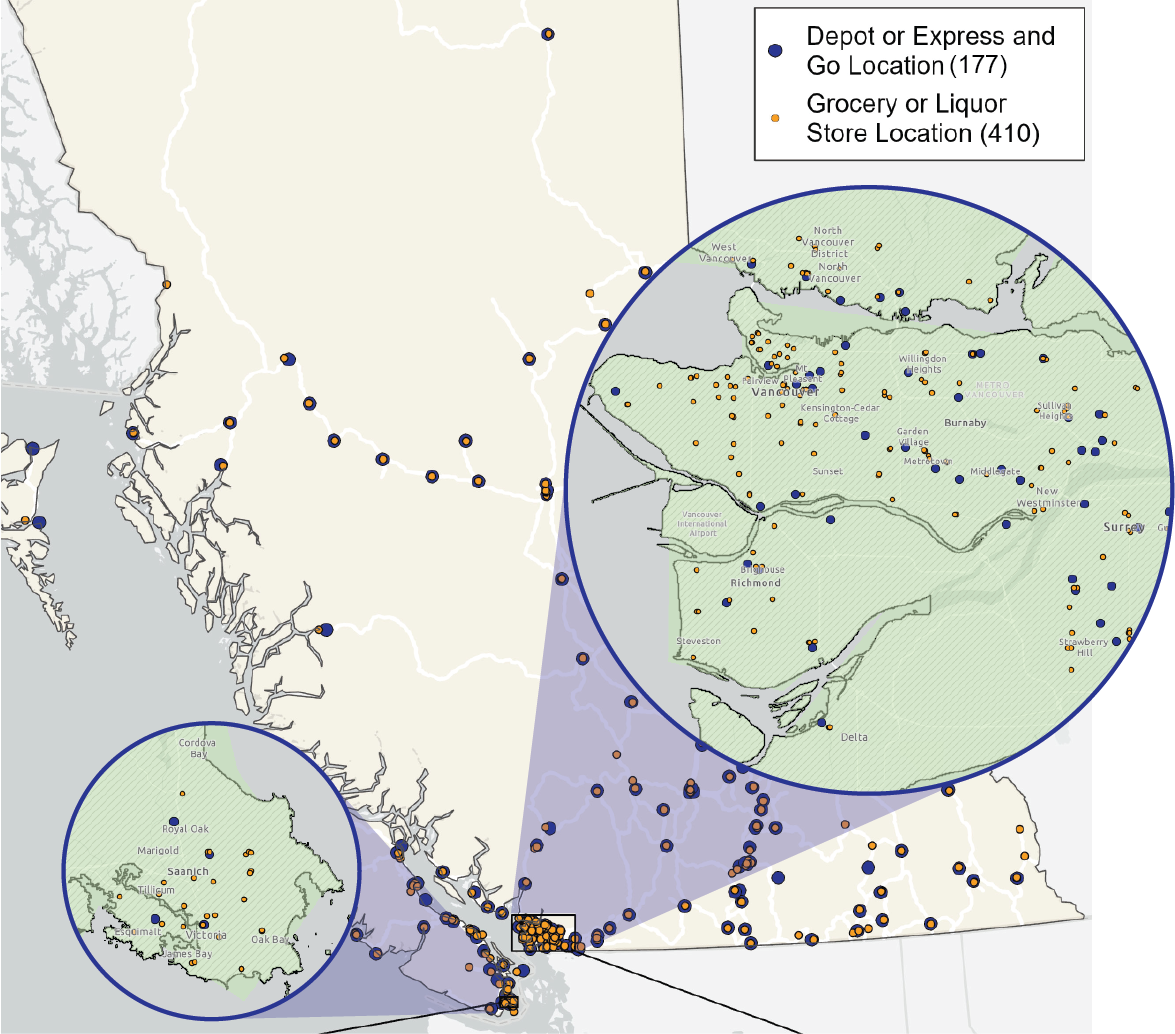4 Collection System and Facilities
- Success of the Return-It network.
- How the collection system works.
- Map of British Columbia pinpointing the collection network and processing sites.
- GIS Mapping and accessibility analysis
4.1 Convenience and Innovative Enhancements
2022 was a dynamic and exciting year for Encorp’s operations and collection network. A brand-new category of used beverage containers was added to the deposit system in February 2022, which was milk and plant-based beverage containers. In addition, Encorp continued to expand popular programs, focus on process improvement, and support the expansion of automation technology to streamline container processing at additional locations.
Overview
In terms of challenges faced in the year, Encorp’s collection network is under increasing pressure from gentrification and densification in metropolitan and urban centres. This environment has made it difficult to maintain the number of independently operated depots serving BC consumers, as redevelopment often leads to depot closures. The number of independently operated Return-It depots dropped to 163 in 2022 from a peak of 174 in 2015. In order to maintain our accessibility and convenience for consumers, we continue to expand the number of Express-only sites that meet the needs of customers in areas where traditional depots cannot be sited.
For the reasons mentioned above, Encorp’s collection network is evolving. The network now consists of 163 independently owned Return-It depot collection facilities that have collection agreements with Encorp, two corporate Return-It Express Plus locations in urban centres, and 12 solar-powered, unstaffed Express & GO stations in various locations across BC.
Our collection network continues to be the cornerstone for many community-based recycling programs around the province. Other approved stewardship programs in BC utilize the Return-It network of depots for collecting and managing recyclables in their respective programs. In addition to used beverage containers, BC residents can recycle end-of-life materials such as electronics, small appliances, batteries, used paint, and motorized yard tools depending on which programs their local Return-It depot participates in.
The organization’s focus remained on expanding our successful programs to provide BC consumers with convenient access to a modern collection network. This expansion was in parallel with the aforementioned addition of milk and plant-based beverage containers to the deposit system, which is a new major category of containers to carry a refundable deposit.
Building on the existing convenient Return-It Express program which continues to grow in popularity, Encorp expanded access to simplified sorts in 2022. This procedure was introduced in late 2021 with the intention to streamline the direct handling of containers and thus improve efficiency.
Customers who prefer an immediate cash refund by visiting a depot and pre-sorting their containers save time by sorting in only 8 categories. This has been proven to decrease customer processing time significantly, thereby reducing the time spent at the depot. Simplified sorting is particularly important due to the addition of milk and plant-based beverage containers in 2022. The simplified sort procedure is now offered at 75% of depots across the province. Encorp plans to continue to expand this system across the network with a goal of all depots operating on simplified sorts.
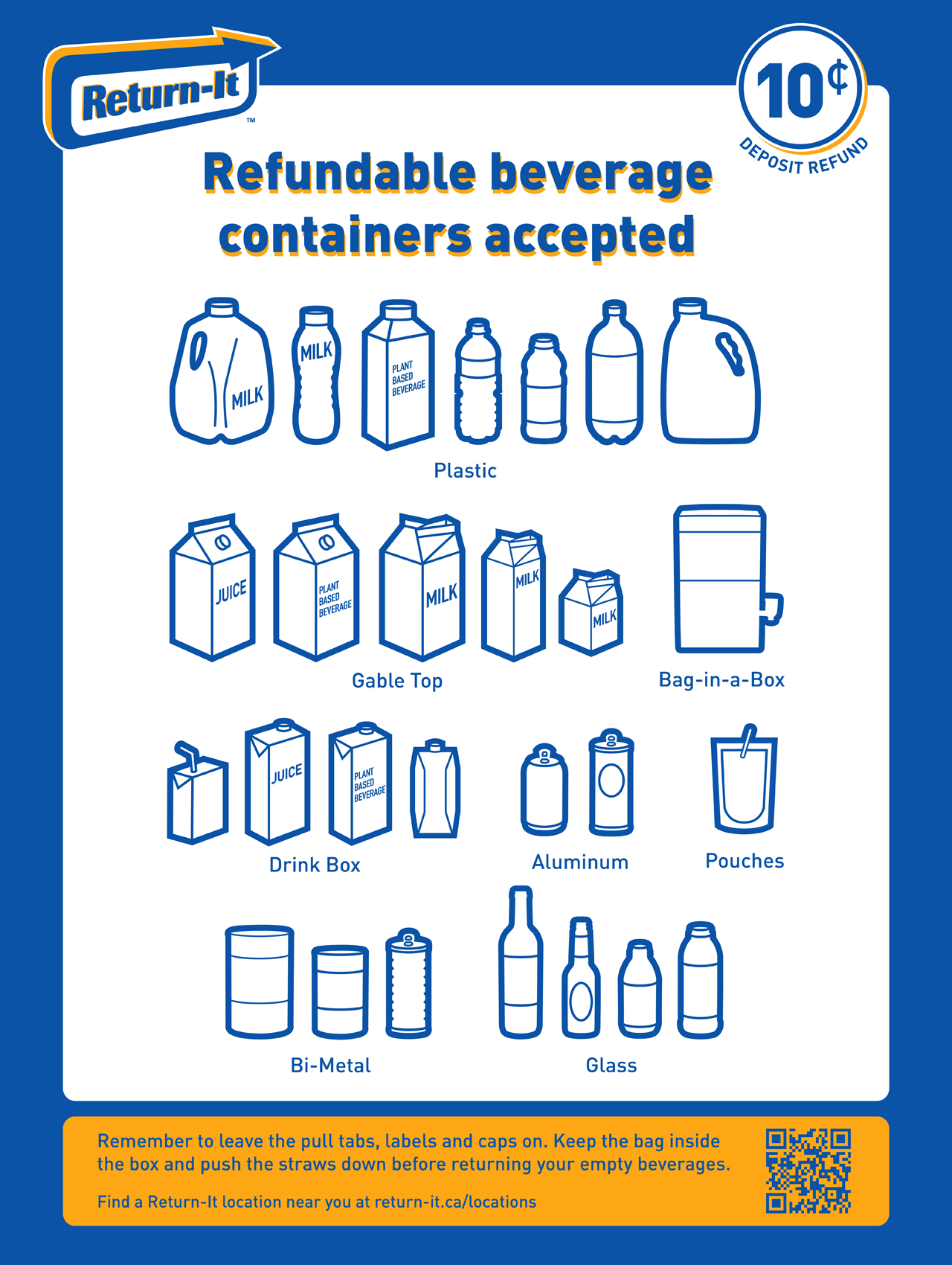
Expansion of Depot Automation
Six additional Return-It depots adopted automation technology in 2022, greatly increasing the speed and accuracy of container handling compared to manual counting. With the introduction of simplified sorts, Encorp saw more depots adopt this technology either in combination with reverse vending machines for customer use, for more efficient backroom processing of Express and commercial bulk volume, or for sorting containers received from over-the-counter customers.
Collected Material Logistics
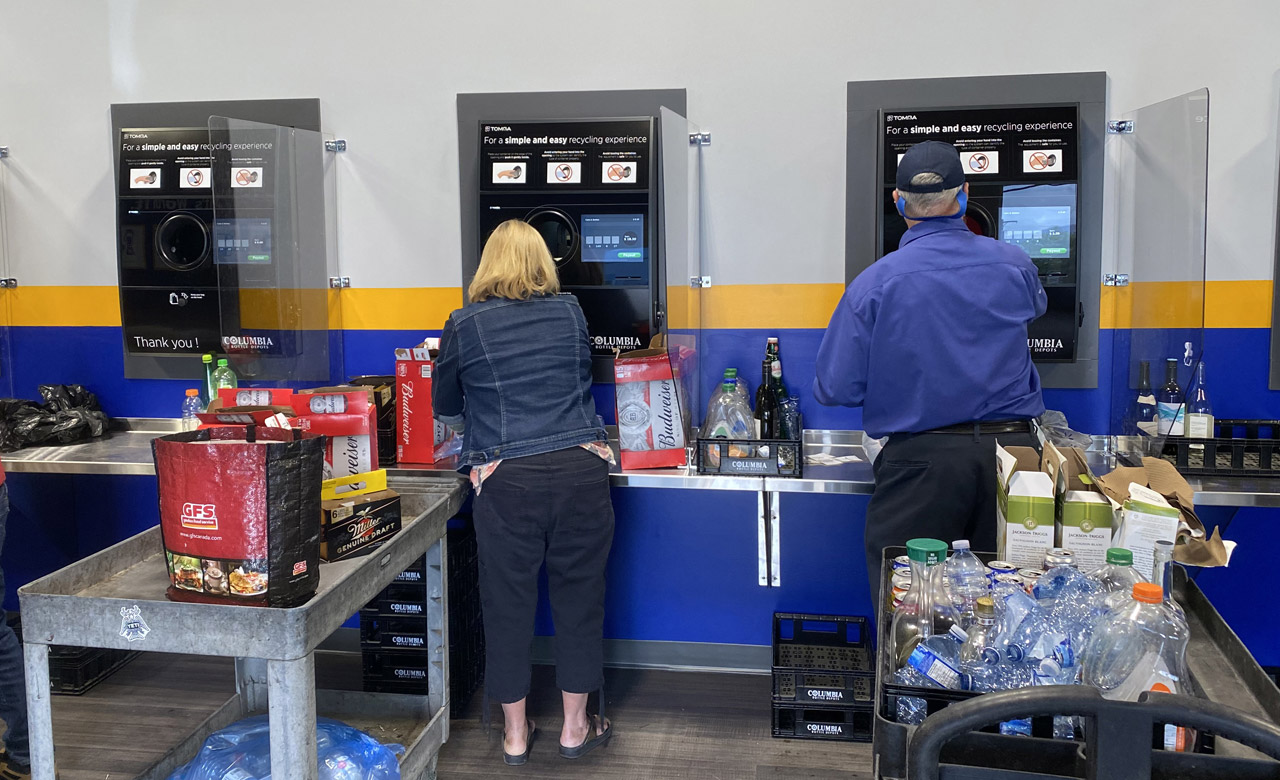
Encorp collaborates with a vast array of transportation partners to collect material from collection points, and to deliver that material to our various processing partners for end recycling. In the spirit of continuous improvement, our goal is to collect and transport this material as efficiently as possible with the lowest impact on our environment necessary. With these goals in mind, Encorp partners with a network comprised of 38 transporters collecting and delivering material into 14 processing sites throughout the province. Within urban centres, we use dedicated transporters that pick up from depots, retailers, and other collection sites. In rural areas, Encorp utilizes transporters that provide back-hauling, resulting in environmental, logistical, and financial savings.
To plan for the additional volume of polyethylene terephthalate (PET), high-density polyethylene (HDPE), and gable top and Tetra Pak material in the system from the addition of milk and milk substitutes, Encorp embarked on an expansion of the successful mobile compaction pilot program. Our mobile compaction program began in 2021, which uses Canada’s first-of-its-kind compressed natural gas (CNG) hybrid-electric compaction trucks to move plastic, gable top and Tetra Pak containers from depots to processing facilities.
By compacting at the point of material collection, each truck allows us to transport six to eight times as much material in a single trailer as compared to a traditional trailer transporting uncompacted material. Global supply chain issues delayed our expansion of the successful pilot program in early 2022, but Encorp was pleased to add two new mobile compaction units late in 2022, allowing us to expand our service to four Lower Mainland Return-It depot routes. This will expand to six routes in 2023.

Return-It Express
The Return-It Express program continued its rapid growth and popularity with British Columbians, as it reached almost 250,000 registered customers in 2022. This is a 29% increase from 2021. Over 155,000 unique customers used the system at least once in 2022, which is a 26% increase from the previous year.
At the end of the year, the Express system accounted for 12% of all the volume collected through depots in the system, and accounted for 21% of volume when only looking at those depots who offer the Express system.
The Return-It Express program provides consumers with a convenient drop-and-go means of recycling for their used beverage containers without the need to pre-sort them for a refund at a depot. This year, Return-It Express was offered at 94 locations across BC, including 80 independently owned Return-It depots, Encorp’s 2 corporate Express Plus locations and Encorp’s 12 Express & GO stations.
Regardless of the type of Express location, customers looking to set up an Express account simply need to sign up online at express.return-it.ca. Once the account is set up, they place their empty beverage containers into transparent bags and take them to a Return-It Express depot near them. Once there, on the touch-screen terminal provided, the customer enters their phone number to log in, print off labels to attach to their bags, and drops off their bags in the designated area. The empty containers are then sorted and counted. The refund on the deposits is credited to their online Express account and can be redeemed for a cheque or Interac e-transfer.
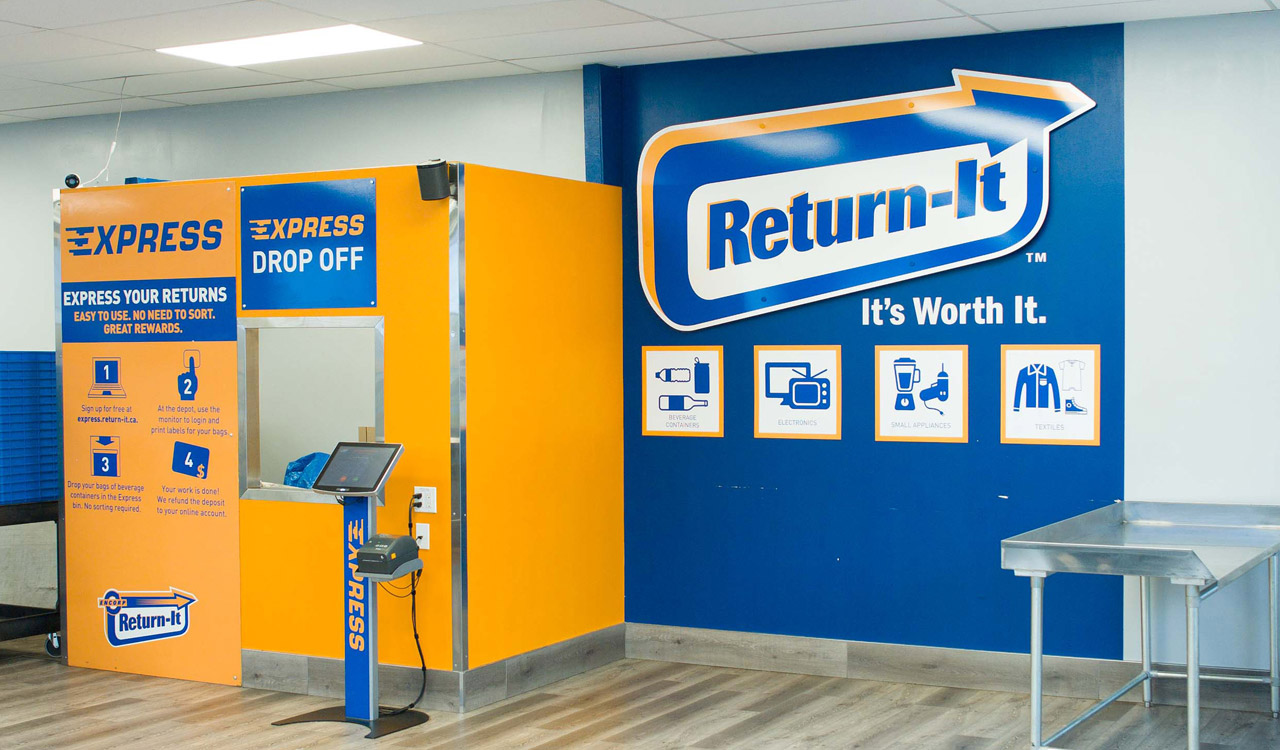
In addition to consumers using the Express system for personal use, the program is a popular way for charitable organizations or school groups to fundraise. These organizations provide the relevant account information to potential donors who can print off the organization’s labels and drop off their containers. The deposits are then added to the account of the organization(s) they choose to support.
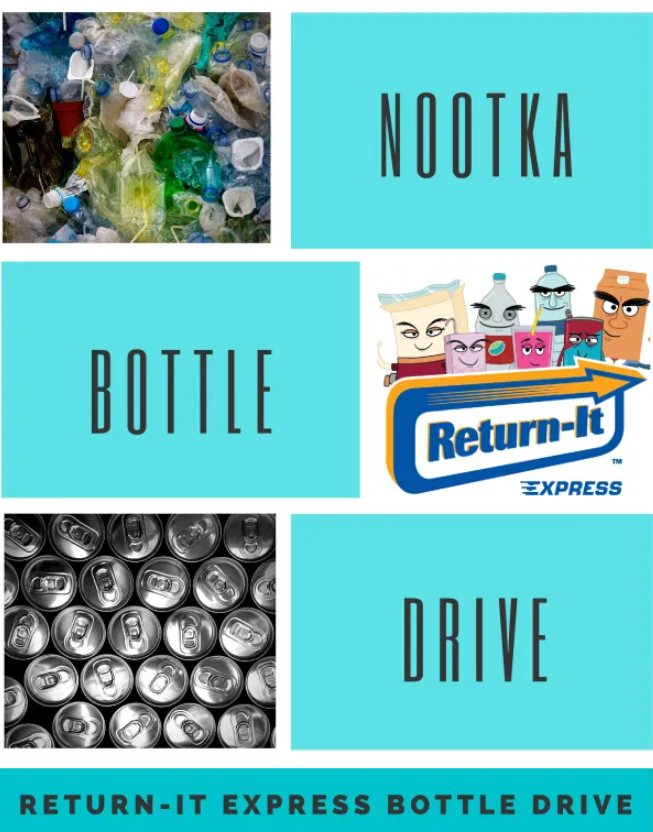
Express & GO
Encorp’s award-winning Express & GO system has become an increasingly popular way to meet the accessibility challenges in BC by providing consumers with additional options for returning their used beverage containers. Encorp repurposes end-of-life shipping containers and transforms them into a solar-powered, unmanned Express & GO stations. This allows us to serve the needs of consumers in areas where traditional collection depots are difficult or impossible to site.
Express & GO stations are deployed in partnership with various stakeholders, such as municipal partners or regional districts at transfer stations, retail partners where we co-locate a station in their parking lots to serve customers on their shopping trips, and educational institutions to serve student and faculty recycling needs. As a result of these efforts, Encorp’s Express & GO stations have become a sought after option for consumers in underserved rural communities or high-density areas where siting a traditional depot is difficult due to of rising real estate costs and/or zoning issues.
Encorp opened three new Express & GO stations in 2022, which increased the total from nine to twelve locations. Encorp expects to continue to expand the Express & GO program in the coming years to supplement the existing depot system as we strive to increase our overall recovery rates. With this in mind, Encorp is working with other stakeholders on numerous additional Express & GO stations for deployment in 2023. The three new locations we opened in 2022 are located at the United Boulevard Recycling and Waste Centre in Coquitlam, the Wholesale Club in Penticton and the Valu Plus Foods in Keremeos.
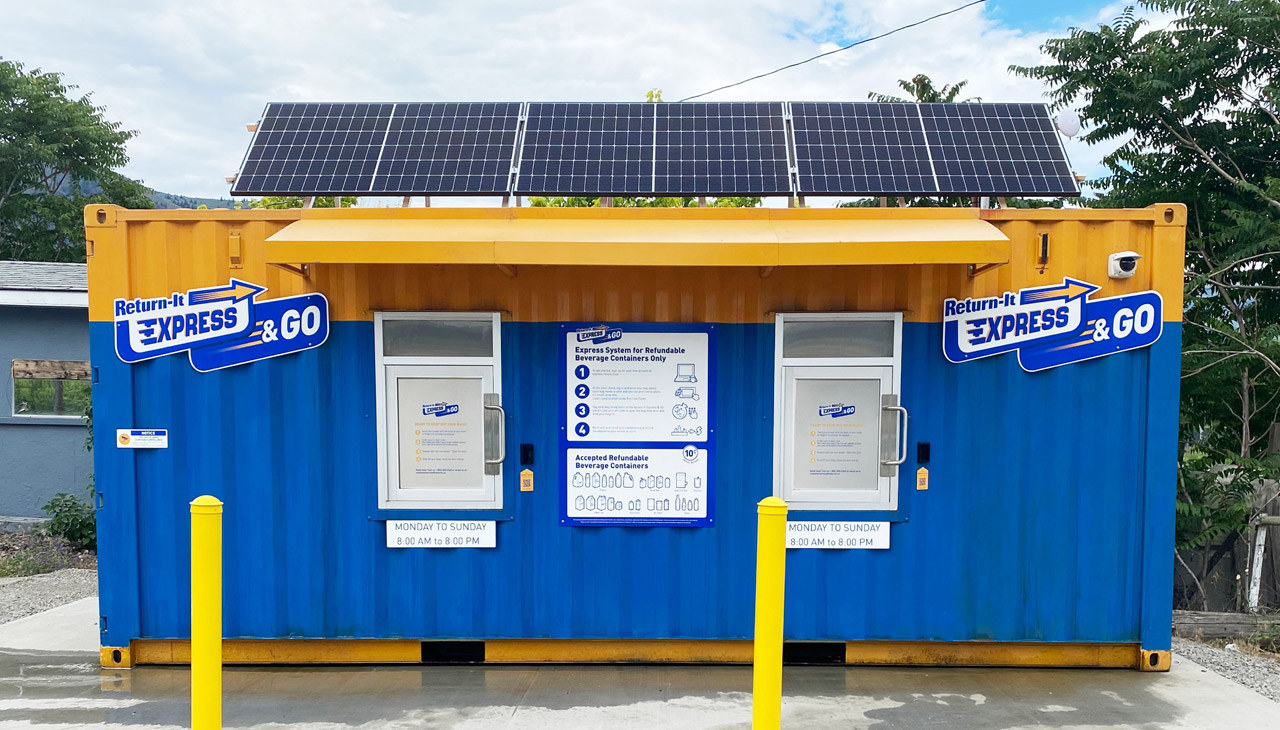
Express Plus Locations
We continued to operate two successful corporate-owned Express-only collection centres known as Express Plus locations this year. These locations serve consumers in dense urban neighbourhoods in Vancouver and North Vancouver. Our two sites have become the model for a modernized used beverage container collection experience that suits the unique characteristics of urban areas that are densifying, with the addition of mixed-use multi-family dwellings. These areas are not typically zoned for bottle depots, and the Express Plus model allows us to provide these consumers with convenient access to recycling.
The popular Yaletown location was renovated in 2022 to add additional storage space and to allow us to move customer’s Express bags offsite more efficiently for counting. Our Express Plus Lo-Lo location, which opened in the second half of 2021, gained traction in 2022 with volume increasing every month, as customers in the area learned about this bright, clean and convenient option for returning their used beverage containers.
To meet the needs of evolving urban communities and reach our recovery goal targets, Encorp continues to look for opportunities to open new Express Plus locations in areas of the province where consumers do not have adequate access to convenient recycling options in their neighbourhoods.
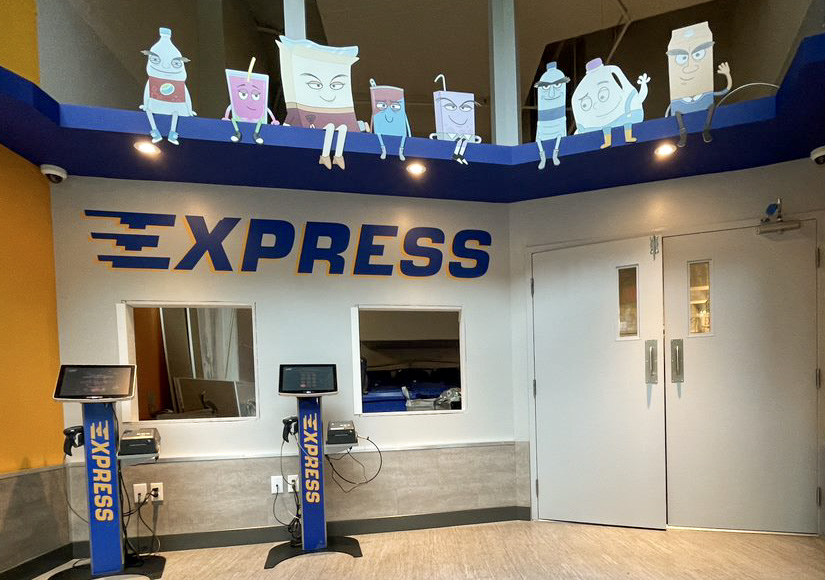
4.2 How the Collection System Works
Encorp’s collection system is comprised of a variety of options for consumers to return their used beverage containers for a deposit refund and to ensure they are recycled.
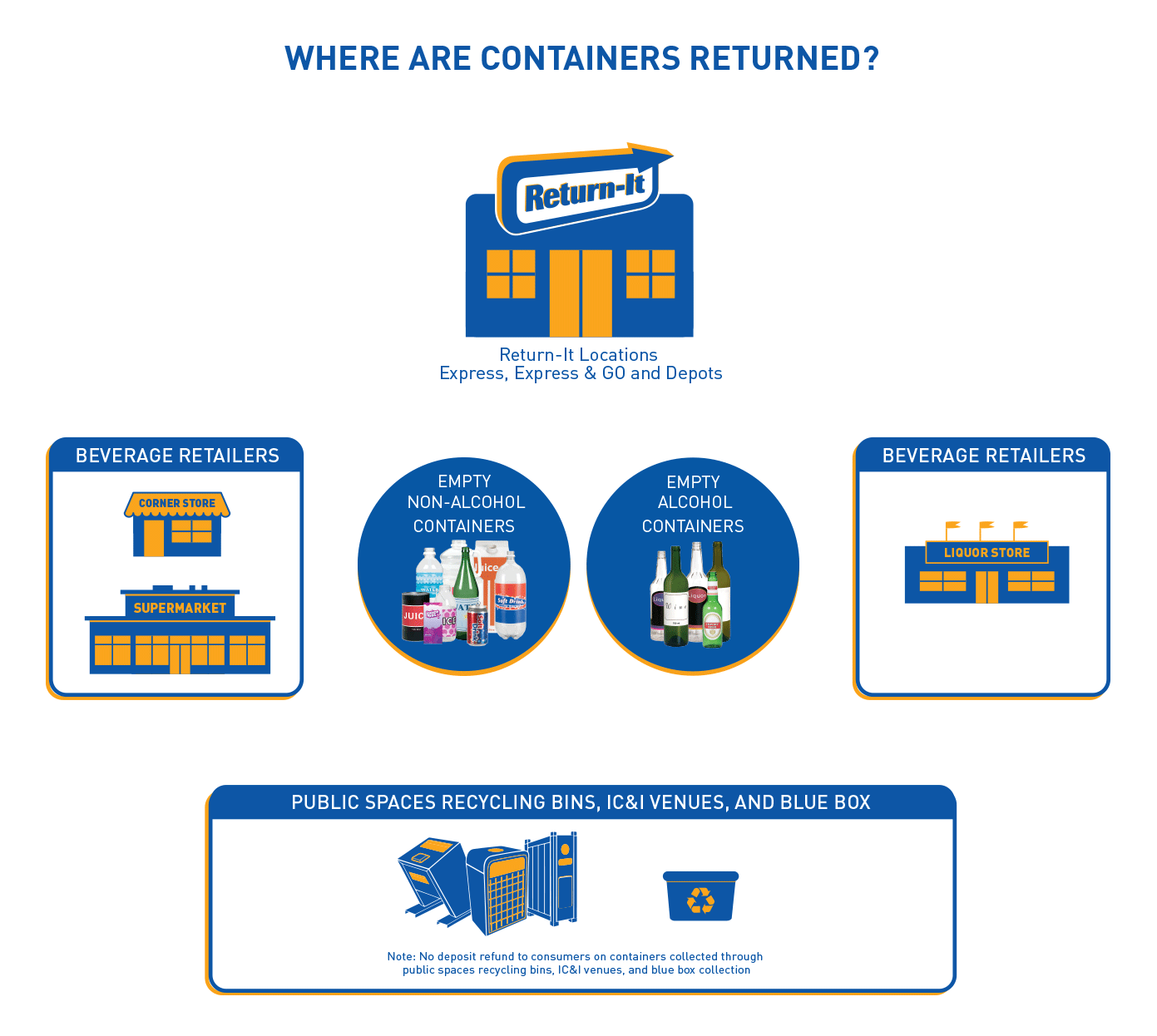
4.3 Collection, Transportation and Processing Map
Encorp’s recycled material network operates through collaboration with our contracted collection, transportation and processing partners. Many of these partners have long-term established contracts, while others are selected periodically through a request for proposal (RFP) procedure. Our transporters partners collect used beverage containers from Return-It depots or other collection points in the network, and deliver them to the nearest approved processor. At the processor, material is compacted and prepared for shipping to various end-market recyclers. These steps ensure that, on a weighted basis, 86% of the kilometers a container travels will be in a compacted state, keeping greenhouse gas (GHG) emissions at a minimum.
 Express Plus
Express Plus
 Express & GO
Express & GO
 Return-It Depot
Return-It Depot
 Processing Plant
Processing Plant
 Consolidation Site
Consolidation Site
Note: Map outlines collection, transportation and processing for all commodities except glass.
For detailed location search, please visit return-it.ca/locations.
4.4 GIS Mapping and Accessibility Analysis
Since commencing operations in 1994, we have established a comprehensive network of permanent collection locations where the public can conveniently return beverage containers covered within Encorp’s plan.
Encorp has engaged a third party, Licker Geospatial, to conduct a complete benchmark geographic information system (GIS) mapping analysis to ensure reasonable access as outlined in the Recycling Regulation. The criterion started with the premise of serving more than 97% of the province’s population. The mapping and accessibility analysis was recalculated in 2022 and included a comparison year-over-year from the baseline done in 2021.
Licker Geospatial has completed accessibility analyses for all Return-It facility locations using the 2021 population at the dissemination block level and three different accessibility standards:
1. Four Thousand Population Threshold
Defines urban accessibility as a facility within a 30-minute driving radius. For rural coverage (outside a census metropolitan area), assessed for communities where the census subdivision’s total population was equal to or exceeded 4,000, access is defined as passing standard if it is within a 45-minute driving radius.
2. Three Thousand Population Threshold
Identical to the 4-kilometre population threshold, with the exception of rural coverage (outside a census metropolitan area) being assessed for communities where the census subdivision’s total population was equal to or exceeded 3,000.
3. Revised Standard
Defines urban accessibility as a facility within a 15-kilometre radius. Rural accessibility is defined as within 60 kilometres when the community is within 200 kilometres of a census metropolitan area.
Using specialized Esri ArcGIS Pro processes, drive times and planar distances were calculated from each dissemination block’s centroid to the nearest facility in order to assess whether the resident population had sufficient access under the three standards. Access to 2022 facilities was assessed on the respective years’ road network, though only 2021 population numbers were used, as census data is only available in five- year intervals and was thus the most accurate data available. Provincially, the following percentage of the population was found to have access to a Return-It facility under the previously described standards for both 2020 and 2021.
- Four Thousand Population Threshold 99.20% Access
- Three Thousand Population Threshold 99.15% Access
- Revised Standard 99.19% Access
Given the goal of 97% of the population (within the standard’s evaluation parameters of rural coverage) of having access to a Return-It facility, provincially, all three standards meet this target.
While the previously described analyses were completed for all Return-It facilities, including grocery and liquor store locations, access varies when only depots and Express & GO locations are considered. Under the same revised standard described previously, 98.89% of the population has passing access to the depots, Express Plus or Express & GO locations alone, a reduction of only 0.31% compared to when all facilities are included.
The difference in access largely relates to changes in servicing levels. Between 2021 and 2022, there was an addition of one depot location, and a reduction in Grocery and Liquor Store (GLS) locations (420 to 410). The reduction of GLS locations did not have greater than a -0.1% impact in any scenario, with the greatest impact occurring in area communities within 200km of a CMA that have small populations. When considering Depot only access, the addition of a new depot resulted in a slight increase (0.05%) in population with access.
